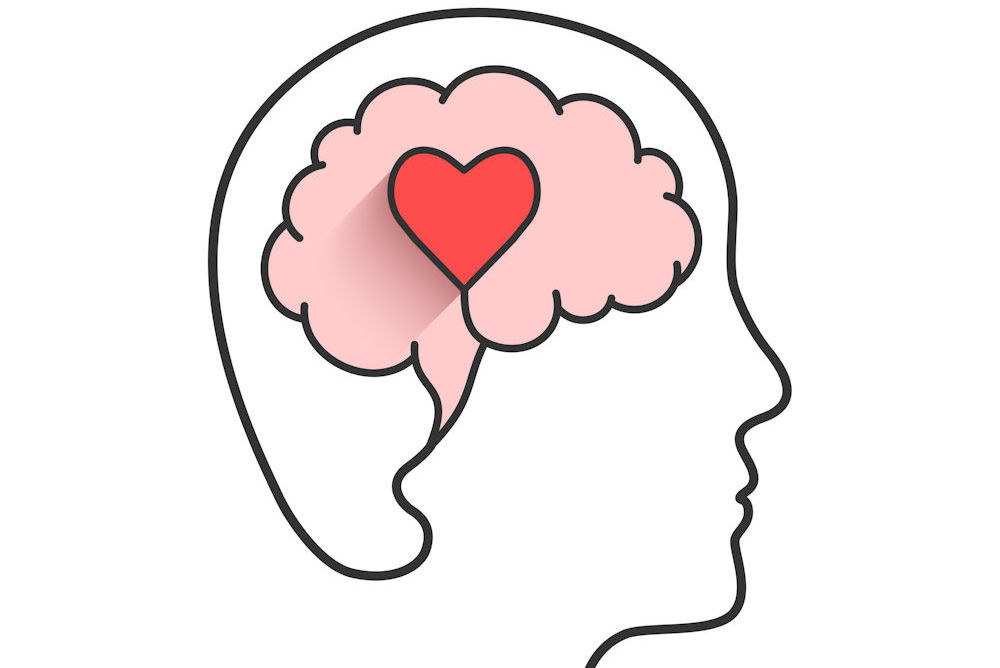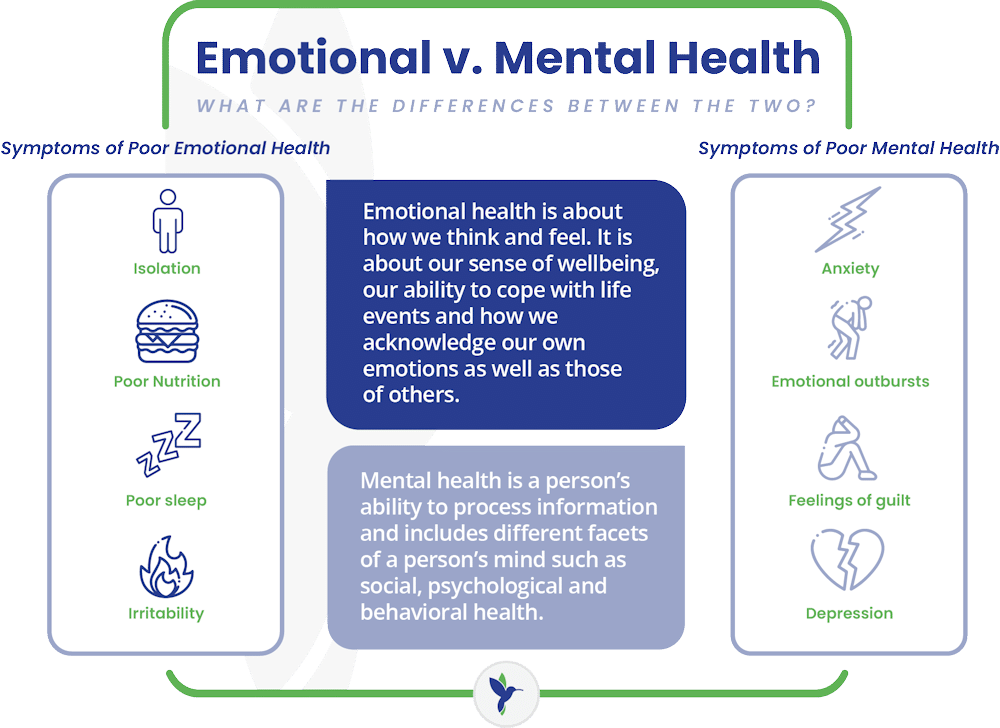Have you ever wondered about the difference between mental health and emotional health? It’s a question that often crops up because, at first glance, they seem pretty similar. However, the truth is, they’re like two sides of the same coin, each playing a unique role in our overall well-being. While mental health deals with our thoughts and behaviors, emotional health focuses on our feelings and relationships.
Understanding these distinctions is crucial for nurturing both aspects and achieving a balanced, fulfilling life. Ambrosia located in South Florida focuses on the nuances of emotional vs mental health to shed light on their importance in our journey to wellness.
What is Emotional Health?
Emotional health refers to the state of our emotional well-being and our ability to understand, express, and constructively manage our feelings. It involves recognizing and acknowledging a wide range of emotions, from joy and contentment to sadness and anger, and being able to navigate them effectively.
Emotional health encompasses being in tune with our emotions, understanding their triggers, and responding to them in ways that promote psychological balance and resilience. It involves developing healthy coping mechanisms, fostering positive relationships, and seeking support when needed. Emotional health is integral to overall well-being, influencing how we perceive ourselves, relate to others, and navigate the challenges of daily life.
What is Mental Health?
Mental health refers to our emotional, psychological, and social well-being. It encompasses how we think, feel, and act as we navigate life’s challenges, cope with stress, interact with others, and make choices. Mental health is crucial for maintaining balance in our lives, forming and sustaining relationships, handling adversity, and realizing our potential. It influences how we perceive ourselves, manage our emotions, handle stress, and make decisions.
Good mental health doesn’t mean the absence of mental illness, but rather a state of well-being where individuals can realize their abilities, cope with the normal stresses of life, work productively, and contribute to their communities.
Emotional vs Mental Health
Mental and emotional health are closely related but have distinct differences. They include some of the following:

Mental health is about how our brains function, like remembering things, solving problems, and handling tough situations. It also involves how we see and understand the world around us.
Emotional health, on the other hand, is all about recognizing and dealing with our feelings—whether it’s joy, sadness, anger, or fear. It’s like having the ability to understand why we feel a certain way and knowing how to handle those feelings healthily.
While mental health focuses on thinking and coping skills, emotional health is more about how we feel and express ourselves. Both mental and emotional health plays a big role in our lives, affecting how we behave, how we get along with others, and how much we enjoy life.
The differences in thinking between mental and emotional health are all about how we handle situations. Think of mental health as being more about making logical decisions, while emotional health is more about going with your gut feelings. Mental health is also about how we sort things out, think things through, and remember stuff, while emotional health is all about expressing our feelings, dealing with them, and building connections with others.
When we understand these differences, we can see how each part plays a role in keeping us healthy and happy.
Our mental health impacts so much of our daily lives, from how we sleep and eat to how we interact with others and even whether we turn to substances for relief. Sometimes, shifts in behavior can signal deeper mental health concerns that need attention.
Meanwhile, emotional health plays a crucial role in how we express ourselves and connect with those around us. Whether it’s experiencing mood swings, withdrawing socially, or struggling in relationships, our emotional well-being shapes our interactions and experiences in profound ways.
How to Tell If Someone is Struggling with Emotional vs Mental Health
Distinguishing between emotional and mental health struggles can be challenging, as they often intertwine. However, there are some key differences to consider.
Emotional struggles often arise in response to specific triggers and tend to be temporary. Mental health issues, on the other hand, can persist over a longer period and may significantly impact daily functioning.
Emotional struggles may primarily involve feelings of sadness, anxiety, or irritability, while mental health issues can manifest in physical symptoms such as fatigue, changes in appetite or sleep patterns, and chronic pain.
Emotional struggles may center more on immediate reactions to situations or events. Mental health concerns often involve distorted thought patterns, such as negative self-talk, excessive worry, or difficulty concentrating.
Both emotional and mental health issues can affect relationships, but mental health challenges may lead to more profound disruptions, such as withdrawal from social interactions or difficulty maintaining close connections.
A mental health professional can provide a comprehensive assessment to differentiate between emotional distress and mental health disorders. They use diagnostic criteria, such as those outlined in the DSM-5, to make informed evaluations.
Understanding these distinctions can aid in recognizing when someone may benefit from additional support or intervention, whether it’s through self-care practices, therapy, or other mental health services.
How to Improve Your Mental and Emotional Health
Enhancing mental and emotional well-being involves a multifaceted approach. Here are additional strategies to support your journey toward improved overall health:
Make time for activities that promote relaxation and rejuvenation. These can include meditation, yoga, deep breathing exercises, or spending time in nature.
Focus on healthy habits, including regular exercise, balanced nutrition, adequate sleep, and limiting substance use (e.g., alcohol, caffeine, nicotine).
Cultivate supportive relationships with friends, family, and community members. Spend quality time with loved ones and prioritize communication and connection.
Learn to say no to commitments or situations that drain your energy or cause unnecessary stress. Establishing boundaries helps protect your mental and emotional well-being.
Stay present in the moment and cultivate awareness of your thoughts, feelings, and bodily sensations. Mindfulness techniques can help reduce stress and enhance emotional resilience.
Pursue hobbies, interests, or volunteer work that brings you joy and fulfillment. Engaging in activities that align with your values boosts your sense of purpose and satisfaction.
Learn effective coping strategies to manage stress, such as problem-solving skills, cognitive reframing, journaling, or creative expression.
Stay connected with others and reach out for support when needed. Social support can buffer against the negative effects of stress and promote emotional well-being.
Cultivate a mindset of gratitude by regularly expressing appreciation for the positive aspects of your life. Gratitude exercises can foster optimism and resilience.
By incorporating these practices, you can strengthen your mental and emotional health, fostering greater well-being and resilience against life’s challenges.
Supporting Your Emotional and Mental Health
When challenges become overwhelming, seeking professional help is normal and encouraged to support your mental and emotional health. Treatment options include psychotherapy, like cognitive-behavioral and psychodynamic therapy, which involve exploring thoughts and behaviors with a therapist. Medication managed by a psychiatrist is common for conditions such as depression and anxiety. Explore alternative treatments such as ketamine therapy for mental health, especially in cases of treatment-resistant depression.
Collaborating closely with healthcare providers is crucial for crafting effective treatment plans and supporting ongoing mental health management. Remember, seeking help reflects strength, not weakness. Various options exist to support well-being, stressing the importance of recognizing and addressing needs. Whether through therapy, medication, or alternative treatments, finding the right approach can significantly improve overall mental and emotional health.
Ambrosia Can Help You Heal

Are you ready to take charge of your mental and emotional well-being? At Ambrosia, we understand the intricate balance between mental health and emotional health. Our dedicated team is here to support you on your journey to healing and wellness.
Whether you’re navigating the complexities of emotional distress or facing challenges related to mental health, we offer comprehensive services tailored to your unique needs. From therapy and counseling to medication management and alternative treatments, we provide personalized care to help you thrive.
Don’t let uncertainty hold you back from living a fulfilling life. Take the first step towards healing with Ambrosia by your side. Contact us today to learn more about our services and start your journey towards holistic wellness.





